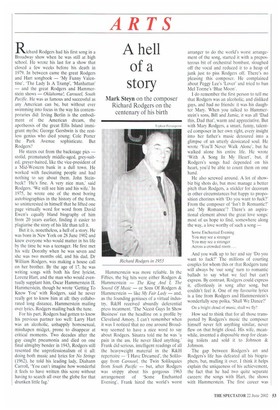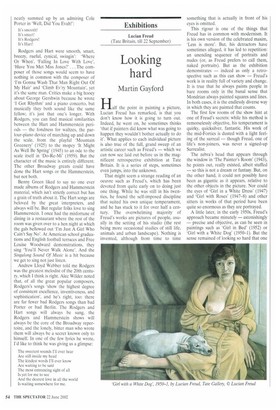A hell of a story
Mark Steyn on the composer Richard Rodgers on the centenary of his birth
Richard Rodgers had his first song in a Broadway show when he was still at high school. He wrote his last for a show that closed a few weeks before his death in 1979. In between came the great Rodgers and Hart songbook — 'My Funny Valentine', The Lady Is A Tramp', 'Manhattan' — and the great Rodgers and Hammerstein shows — Oklahoma!, Carousel South Pacific. He was as famous and successful as any American can be, but without ever swimming into focus in the way his contemporaries did: Irving Berlin is the embodiment of the American dream, the apotheosis of the great Ellis Island immigrant myths; George Gershwin is the restless genius who died young; Cole Porter the Park Avenue sophisticate. But Rodgers?
He stares out from the backstage pies — stolid, prematurely middle-aged, grey-suited, greyer-haired, like the vice-president of a Mid-Western bank in a dull town. He worked with fascinating people and had nothing to say about them. John Steinbeck? 'He's fine. A very nice man,' said Rodgers. 'We still see him and his wife,' In 1975, he wrote one of the most boring autobiographies in the history of the form, so uninterested in himself that he lifted one page virtually word for word from David Evven's equally bland biography of him from 20 years earlier, finding it easier to plagiarise the story of his life than tell it.
But it is, nonetheless, a hell of a story. He was born in New York on 28 June 1902 and knew everyone who would matter in his life by the time he was a teenager. He first met his wife Dorothy when he was seven and she was two months old, and his dad, Dr William Rodgers, was making a house call on her brother. By the age of 17, he was writing songs with both his first lyricist, Lorenz Hart, and the man who would eventually supplant him, Oscar Hammerstein II. Hammerstein, though he wrote 'Getting To Know You' with Rodgers, said he never really got to know him at all: they collaborated long distance, Hammerstein mailing over lyrics, Rodgers mailing back the tune.
For his part, Rodgers had gotten to know his previous partner too well: Larry Hart was an alcoholic, unhappily homosexual, misshapen midget, prone to disappear at critical moments. Two decades after the guy caught pneumonia and died on one final almighty bender in 1943, Rodgers still resented the unprofessionalism of it all: doing both music and lyrics for No Strings (1962), he told his leading lady, Diahann Carroll, 'You can't imagine how wonderful it feels to have written this score without having to search all over the globe for that drunken little fag.' Hammerstein was more reliable. In the Fifties, the big hits were either Rodgers & Hammerstein — The King And I, The Sound Of Music — or Sons Of Rodgers & Hammerstein — like My Fair Lady — and, as the founding geniuses of a virtual industry. R&H received absurdly deferential press treatment. 'The Nicest Guys In Show Business' ran the headline on a profile by Cleveland Amory. I can't remember when it was I noticed that no one around Broadway seemed to have a nice word to say about Rodgers. Sinatra told me he was 'a pain in the ass. He never liked anything.' Frank did serious, intelligent readings of all the heavyweight material in the R&H repertoire — 'I Have Dreamed', the Soliloquy from Carousel, the Twin Soliloquies from South Pacific — but, after Rodgers was snippy about his gorgeous 1963 arrangement of 'Some Enchanted Evening', Frank hired the world's worst arranger to do the world's worst arrangement of the song, started it with a preposterous bit of orchestral bombast, sloughed off the vocal and reduced it to a heap of junk just to piss Rodgers off, There's no pleasing this composer. He complained about Peggy Lee's 'Lover' and tried to ban Mel Torme's 'Blue Moon'.
I do remember the first person to tell me that Rodgers was an alcoholic, and disliked gays, and had no friends: it was his daughter Mary. When you talked to Hammerstein's sons, Bill and Jamie, it was all 'Dad this, Dad that', warm and appreciative. But with Mary Rodgers, a smart, funny, talented composer in her own right, every insight into her father's music detoured into a glimpse of an utterly dessicated soul. He wrote 'You'll Never Walk Alone', but he walked alone his entire life. He wrote 'With A Song In My Heart', but, if Rodgers's songs had depended on his heart, you'd be able to count them on one hand.
He also screwed around. A lot of showbiz big shots do, but most manage a better pitch than Rodgers, a stickler for decorum in other circumstances but happy to proposition chorines with 'Do you want to fuck?' From the composer of 'Isn't It Romantic?' and 'My Romance'? There's an aspirational element about the great love songs: most of us hope to find, somewhere along the way, a love worthy of such a song —
Some Enchanted Evening You may see a stranger You may see a stranger Across a crowded room.
And you walk up to her and say 'Do you want to fuck?' The millions of courting couples for whom this or that Rodgers tune will always be 'our song' turn to romantic ballads to say what we feel but can't express. By contrast, Rodgers could express it, effortlessly in song after song, but couldn't feel it. One of my favourite lyrics is a line from Rodgers and Hammerstein's wonderfully sexy polka, 'Shall We Dance?'
On a bright cloud of music, shall we fly?
How sad to think that for all those transported by Rodgers's music the composer himself never felt anything similar, never flew on that bright cloud. His wife, meanwhile, invented a disposable mop for cleaning toilets and sold it to Johnson & Johnson.
The gap between Rodgers's art and Rodgers's life has defeated all his biographers, but, mulling it over, I think it helps explain the uniqueness of his achievement, the fact that he had two quite separate careers: the songs with Hart, the shows with Hammerstein. The first career was neatly summed up by an admiring Cole Porter in 'Well, Did You Evah!':
It's smooth! It's smart! It's Rodgers! It's Hart!
Rodgers and Hart were smooth, smart, breezy, rueful, cynical, swingin': 'Where Or When'. 'Falling In Love With Love', 'Have You Met Miss Jones?' ... The composer of those songs would seem to have nothing in common with the composer of 'I'm Gonna Wash That Man Right Out Of My Hair' and 'Climb Ev'ry Mountain', yet it's the same man. Critics make a big hooey about George Gershwin because he wrote 'I Got Rhythm' and a piano concerto, but musically they both sound like the same fellow; it's just that one's longer. With Rodgers, you can find musical similarities between the Hart and Hammerstein peri
ods the fondness for waltzes, the parlour-piano device of marching up and down the scale, from the playful 'Mountain Greenery' (1925) to the mopey 'It Might As Well Be Spring' (1945) to an ode to the scale itself in `Do-Re-Mi' (1959). But the character of the music is entirely different. The other Broadway greats could have done the Hart songs or the Hammerstein, but not both.
Benny Green liked to say no one ever made albums of Rodgers and Hammerstein material, which isn't strictly correct but has a grain of truth about it. The Hart songs are beloved by the great interpreters, and always will be. But regular folks love to sing Hammerstein. I once had the misfortune of dining in a restaurant where the rest of the room was given over to a hen night at which the gals bellowed out `I'm Just A Girl Who Cain't Say No'. At American school graduations and English football terraces and Free Louise Woodward demonstrations, they sing 'You'll Never Walk Alone'. And the Singalong Sound Of Music is a hit because we get to sing not just listen.
Andrew Lloyd Webber told me Rodgers was the greatest melodist of the 20th century, which I think is right. Alec Wilder noted that, of all the great popular composers, Rodgers's songs 'show the highest degree of consistent excellence, inventiveness, and sophistication', and he's right, too: there are far fewer bad Rodgers songs than bad Porter or bad Berlin. The Rodgers and Hart songs will always be sung, the Rodgers and Hammerstein shows will always be the core of the Broadway repertoire, and the lonely, bitter man who wrote them will always be a secret known only to himself. In one of the few lyrics he wrote, I'd like to think he was giving us a glimpse:
The sweetest sounds I'll ever hear Are still inside my head The kindest words ever know Are waiting to be said The most entrancing sight of all Is yet for me to see And the dearest love in all the world Is waiting somewhere for me.











































































 Previous page
Previous page